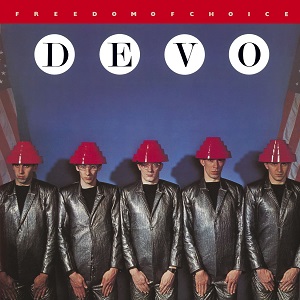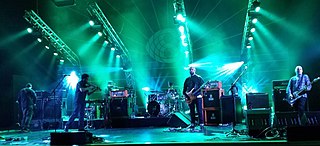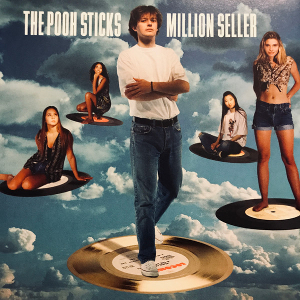Heavenly are a twee pop band, originally forming in Oxford, England in 1989. Amelia Fletcher (vocals/guitar), Mathew Fletcher, Peter Momtchiloff (guitar) and Robert Pursey (bass) had all been members of Talulah Gosh, a key member of the C86 scene.

Camper Van Beethoven is a 1986 album by musical group Camper Van Beethoven, released on Pitch-A-Tent. With the six then CVB members joined in the studio by acid-folk eccentric Eugene Chadbourne, the album is arguably the zenith of the band's musical experimentation, with surreal lyrics, backwards, sped-up and slowed down parts; a portion of the track "Stairway To Heavan" (sic) is itself a musical palindrome. A great number of ethnic instruments are used in addition to the usual violin parts played by member Jonathan Segel; the album also features pedal steel, banjo, tablas and sitar.

Congregation is the third studio album by American alternative rock band The Afghan Whigs. It was released on January 31, 1992, by Sub Pop and followed two years of the band's touring in support of their first album for the label, Up in It (1990).

Freedom of Choice is the third studio album by the American new wave band Devo, released in May 1980 on Warner Bros. Records. The album contained their biggest hit, "Whip It", which hit No. 8 and No. 14 on the Billboard Club Play Singles and Pop Singles charts, respectively. Freedom of Choice peaked at No. 22 on the Billboard Pop Albums chart.

Bernard Sumner is an English musician and record producer. He is a founding member of the bands Joy Division, New Order, Electronic and Bad Lieutenant. Sumner was an early force in several areas, including the post-punk, synthpop, and techno music scenes, as well as their various related genres, and was an early influence on the Manchester music scene that presaged the Madchester movement of the late 1980s centred on Factory Records and The Haçienda club in Manchester.

Electronic were an English alternative dance supergroup formed by singer/guitarist Bernard Sumner and guitarist Johnny Marr. They co-wrote the majority of their output between 1989 and 1998, collaborating with Neil Tennant and Chris Lowe, of Pet Shop Boys on three tracks in their early years, and former Kraftwerk member Karl Bartos on nine songs in 1995.

The Apples in Stereo, are an American indie rock band associated with Elephant 6 Collective, a group of bands also including Neutral Milk Hotel, The Olivia Tremor Control, Elf Power, Of Montreal, and Circulatory System. The band is largely a product of lead vocalist/guitarist/producer Robert Schneider, who writes the majority of the band's music and lyrics. Currently, The Apples in Stereo also includes longstanding members John Hill and Eric Allen (bass), as well as more recent members John Dufilho (drums), John Ferguson (keyboards), and Ben Phelan (keyboards/guitar/trumpet).

Joseph Donald Mascis Jr., better known as J Mascis, is an American musician who is the singer, guitarist and main songwriter for the alternative rock band Dinosaur Jr. He has also released several albums as a solo artist and played drums and guitar on other projects. He was ranked number 74 in a Rolling Stone list of the "100 Greatest Guitarists", and number 5 in a similar list for Spin magazine in 2012.

Talulah Gosh were an English guitar-pop group from Oxford, and one of the leading bands of the indiepop movement, taking their name from the headline of an NME interview with Clare Grogan. They supposedly formed in 1986 when Amelia Fletcher and Elizabeth Price, both wearing Pastels badges, met at a club in Oxford. Their original line-up comprised Amelia Fletcher, her younger brother Mathew Fletcher (drums), Peter Momtchiloff, Rob Pursey (bass) and Elizabeth Price (vocals). Pursey left early on, to be replaced by Chris Scott.

Corin Lisa Tucker is an American singer, songwriter, and guitarist best known for her work with rock band Sleater-Kinney. Tucker is also a member of the alternative rock supergroup Filthy Friends, and previously recorded with the indie rock group Heavens to Betsy and The Corin Tucker Band.

Mogwai are a Scottish post-rock band, formed in 1995 in Glasgow. The band consists of Stuart Braithwaite, Barry Burns, Dominic Aitchison, and Martin Bulloch (drums). Mogwai typically compose lengthy guitar-based instrumental pieces that feature dynamic contrast, melodic bass guitar lines, and heavy use of distortion and effects.
The Pooh Sticks were a Welsh indie pop band from Swansea, Wales, primarily recording between 1988 and 1995. They were notable for their jangly melodiousness and lyrics gently mocking the indie scene of the time, such as on "On Tape", "Indiepop Ain't Noise Pollution" and "I Know Someone Who Knows Someone Who Knows Alan McGee Quite Well". The band changed direction on their 1991 U.S breakthrough The Great White Wonder, eschewing the 'twee' British indie pop sound for a more American-styled power pop sound, akin to bands such as Jellyfish and Redd Kross. Subsequent albums included Million Seller, released on 11 January 1993, considered by some power pop fans to be the band's best work, and Optimistic Fool, released on 24 April 1995, followed in this style.

Amelia Fletcher is a British singer, songwriter, guitarist and economist.
Ian Alec Harvey Dench is an English songwriter and musician. He is the guitarist and principal songwriter for EMF, who scored a major international hit reaching number 1 in the United States with "Unbelievable" in 1991. It was voted one of BBC Radio 2's 'Greatest Guitar Riffs'.

Smash Your Head on the Punk Rock is a compilation album by the American indie rock band Sebadoh. It was released in 1992, and marked the band's debut on Sub Pop.

Paul Mullen is an English musician, multi-instrumentalist & singer songwriter who first gained recognition for being vocalist and guitarist of the band Yourcodenameis:milo, who went on hiatus in 2007. Since their hiatus, Mullen has gone on to both join and form a number of bands, which he currently splits his time between – including The Automatic, Young Legionnaire, Losers, HorseFight and Bleach Blood.

Eccsame the Photon Band is the second full-length 1994 album by the American indie rock band, Lilys, originally released on the spinART label. The album saw the band move towards dream pop. The notoriously nomadic Kurt Heasley refers to this period of Lilys history as EPOCH I, also included is his first seven-inch single " February Fourteenth", the mini LP A Brief History of Amazing Letdowns and Lilys' first full-length album, In The Presence of Nothing. Eccsame the Photon Band was recorded at Mike Deming's Studio 45 in Hartford, Connecticut, largely as duo of Heasley and Harold Evans.
"Funtime" is a song written by Iggy Pop and David Bowie, first released by Iggy Pop on his 1977 album entitled The Idiot. It reflects Iggy and Bowie's growing fascination with the German music scene, and bears marked similarities to "Lila Engel" by krautrock band Neu!. It has since been covered by multiple artists including Blondie, Boy George, Bebe Buell, Peter Murphy, R.E.M. and The Cars.

Scavenger is the fourth studio album by The Walkabouts released September 1, 1991, on Sub Pop Records. It received national exposure in the United States through NPR. The album is available in various forms from Amazon.com and as digital download from iTunes Store in the US and the United Kingdom among others.

Million Seller is an album by the Welsh alternative rock band the Pooh Sticks, released in 1993. The album was a commercial disappointment, and the band was dropped by Zoo Entertainment after its release.
















